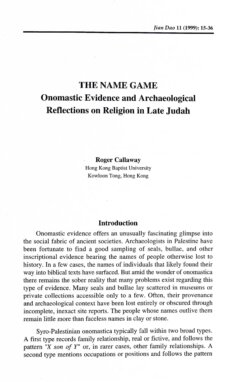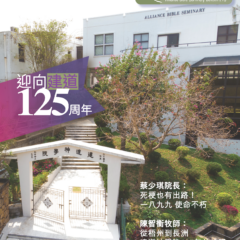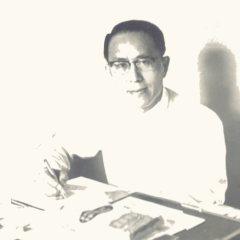THE NAME GAME: Onomastic Evidence and Archaeological Reflections on Religions in Late Judah(命名遊戲──猶大人名字的考古發現及晚期猶大的宗教情況) / Roger Callaway 卡拉韋
撮要
泰蓋伊(Jeffery Tigay)在較早前指出,從考古資料顯示,以色列人的命名習 慣代表著以色列民族普遍傾向一神主義而排拒多神主義。但作者認為這種分析流於偏頗,他認為考古學的發現正反映著晚期猶大的宗教情況是如其他社會般複雜的。
ABSTRACT
Archaeological researchers and biblical scholars have long recognized the value of onomastic evidence for understanding the culture of Israel and Judah in the late biblical period. While a tacit agreement exists among scholars that epigraphic material reveals only the upper strata of society, about a decade ago Jeffrey Tigay asserted that ancient Israelites names, which overwhelmingly include Yahwistic theophorous elements, show a decidedly pro-monotheistic and anti-polytheistic religious stance among the ancient Israelite population generally. However, this analysis fails to consider other, alternative explanations of the data and treats onomastic evidence as reliable indicators of complex theological ideas for an entire population. This assertion also assumes that a well-defined and fixed, bi-polar choice between official/monotheistic and popular/polytheistic religion was clearly manifest to ancient Israelites themselves. Placing onomastica within their archaeological context reveals that they likely represent some aspect of urban religion, particularly in late Iron II Judah. But even if onomastica reveal some aspect of urban religion, this does not infer that urban religion in late Judah was uniform or that other, non-urban forms of religion existed in an absolutely antithetical relation to urban religion. It seems much more likely that “family” and “state” aspects of religion existed in a compatible way in late Judah, and indeed throughout Israelite history. Yet, it is only in proper dialogue between biblical and archaeological data that the richness of religion in ancient Israel and Judah, as endemic of all societies, will be recovered.
原載於《建道學刊》11期(1999年1月),頁15-36。







